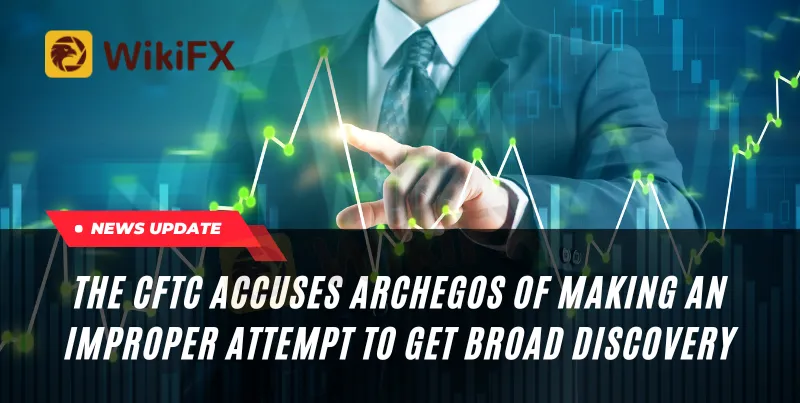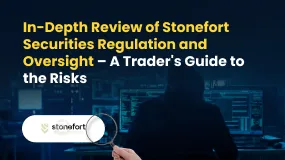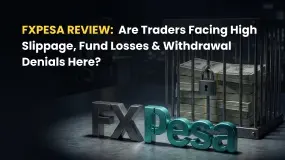简体中文
繁體中文
English
Pусский
日本語
ภาษาไทย
Tiếng Việt
Bahasa Indonesia
Español
हिन्दी
Filippiiniläinen
Français
Deutsch
Português
Türkçe
한국어
العربية
The CFTC Accuses Archegos Of Making An Improper Attempt To Get Broad Discovery
Abstract:About a week after Archegos Capital Management, LP and Patrick Halligan stated their opposition to a complete stay of discovery in the Commodity Futures Trading Commission (CFTC) proceedings, the regulator replied to the defendants' reasons.

According to the CFTC complaint, Archegos and Archegos's CFO, as well as others acting on their behalf or under their direction, engaged in a scheme in which they intentionally and/or recklessly provided false or misleading material information and/or omitted to provide such material information to their trading swap counterparties over the course of a year, between March 2020 and March 2021.
The Department of Justice (DOJ) has attempted to intervene and halt the CFTC proceedings. The defendants maintained that a partial stay would be more appropriate.
On November 23, 2022, the CFTC submitted its response to the defendant's claims in the New York Southern District Court.
The CFTC adds that it takes no position on the United States move to delay discovery awaiting the outcome of the Criminal Case, and hence does not oppose the motion. The CFTC, on the other hand, opposes any attempt by the Defendants to partly stay this action on asymmetrical conditions that would allow Defendants to acquire information while insulating Defendants from having to submit discovery themselves.
According to the regulator, the Court should reject any such request because it is inefficient, inequitable, and would unjustly bias the Commission.
According to the CFTC, defendants claim to object to the “premature” and “blanket” nature of the stay sought by the United States and instead suggest that the Court evaluate each specific future discovery request individually to determine whether such discovery would jeopardize the criminal proceedings or infringe on any person's Fifth Amendment rights. The defendants' approach, on the other hand, implicitly assumes that discovery would be not just incomplete, but also notably asymmetrical.
The CFTC claims that, although the Defendants do not state it specifically, it is evident that Halligan is considering claiming his Fifth Amendment protection against self-incrimination in order to escape discovery under the Defendants' plan. As a result, “discovery,” as envisioned by Defendants, would be a primarily one-sided event.
According to the Defendants' plan, the CFTC must give initial disclosures, reply to extensive document demands, answer interrogatories and requests for admission, and prepare for and attend depositions notified by the Defendants. In contrast, if Halligan and/or Hwang merely state that testifying would violate their Fifth Amendment protection against self-incrimination, the CFTC would be unable to get their testimony or replies to interrogatories and demands for admissions from Halligan.
As a result, the CFTC would be barred from collecting information clarifying Defendants' arguments or defenses, or knowing what facts are in dispute.
The regulator explains that, while Halligan has a right to avoid self-incrimination, defendants do not have a right to use the Fifth Amendment privilege as both a sword and a shield by obtaining the benefits of the privilege against self-incrimination without actually having to assert the Fifth Amendment or suffer the consequences.
The CFTC concludes, “The Court should perceive Defendants' motion for what it is: an inappropriate effort to gain broad-ranging information while Defendants are insulated from disclosing discovery to the CFTC.”
The Commission does not oppose the United States move for a full stay of discovery and urges that the Court rejected the Defendants' proposal for a partial stay.
Stay tuned for more Forex Broker news.
Download the WikiFX App from the App Store or Google Play Store to stay updated on the latest news.

Disclaimer:
The views in this article only represent the author's personal views, and do not constitute investment advice on this platform. This platform does not guarantee the accuracy, completeness and timeliness of the information in the article, and will not be liable for any loss caused by the use of or reliance on the information in the article.
Read more

In-Depth Uniglobe Markets Commission Fees and Spreads Analysis – What Traders Should Really Know
For experienced traders, the cost of execution is a critical factor in broker selection. Low spreads, fair commissions, and transparent pricing can be the difference between a profitable and a losing strategy over the long term. This has led many to scrutinize the offerings of brokers like Uniglobe Markets, which presents a tiered account structure promising competitive conditions. However, a professional evaluation demands more than a surface-level look at marketing claims. It requires a deep, data-driven analysis of the real trading costs, set against the backdrop of the broker's operational integrity and safety. This comprehensive Uniglobe Markets commission fees and spreads analysis will deconstruct the broker's pricing model, examining its account types, typical spreads, commission policies, and potential ancillary costs. Using data primarily sourced from the global broker inquiry platform WikiFX, we will provide a clear-eyed view of the Uniglobe Markets spreads commissions prici

In-Depth Review of Stonefort Securities Regulation and Oversight – A Trader's Guide to the Risks
For experienced traders, the process of selecting a new broker transcends a simple comparison of spreads and leverage. It is a meticulous due diligence exercise where the integrity of the broker's regulatory framework is paramount. Stonefort Securities, a relatively new entrant in the crowded brokerage space, presents a complex and often contradictory profile. On one hand, it boasts a modern MT5 platform and a stream of positive user testimonials. On the other hand, it is shadowed by severe regulatory warnings that question the very foundation of its operations. This in-depth review focuses on the core issue for any long-term trader: Stonefort Securities regulation and oversight. We will dissect the broker's corporate structure, scrutinize its licensing claims, and analyze what the data implies for trader protection and fund security. For traders evaluating whether Stonefort Securities is a trustworthy partner, understanding these details is not just important—it is essential.

FXPesa Review: Are Traders Facing High Slippage, Fund Losses & Withdrawal Denials?
Do FXPesa support officials fail to pick up your calls when you raise fund withdrawal requests with the broker? But are these officials always open to you regarding fund deposits? Do you frequently spot slippage and stop-loss order execution errors on the FXPesa login? These issues are increasingly becoming common with this forex broker. Consequently, many traders have expressed their dissatisfaction with the broker online. In this FXPesa Review article, we have shared some of these complaints. Take a look!

Trive Investigation: High Score, Hidden Risk - The Profit Paradox
A disturbing pattern has emerged regarding the broker Trive. Despite holding a high WikiFX score (7.91) and valid licenses in South Africa and Australia, recent investor reports suggest a significant disconnect between the platform's reputation and its treatment of profitable clients. While the regulatory paperwork appears in order, our data indicates that traders are facing sudden account freezes and accusations of "trading abuse" precisely when they attempt to withdraw profits. This report investigates why a seemingly "safe" broker is generating high-risk complaints.
WikiFX Broker
Latest News
WikiFX's New Evaluation of ATM Capital LTD: Does its License Protect the Arab Investor?
How a Fake Moomoo Ad Led to the “New Dream Voyage 5” Scam
Is Axi Legit? A Data-Driven Analysis of Its Regulatory Standing and Trader Feedback
FXPesa Review: Are Traders Facing High Slippage, Fund Losses & Withdrawal Denials?
Trive Investigation: High Score, Hidden Risk - The Profit Paradox
In-Depth Uniglobe Markets Commission Fees and Spreads Analysis – What Traders Should Really Know
Bessent believes there won't be a recession in 2026 but says some sectors are challenged
Is GGCC Legit? A Data-Driven Analysis for Experienced Traders
Young Singaporean Trader Grew USD 52 into a USD 107,700 Portfolio
In-Depth Review of INZO Trading Conditions and Product Offering – A Data-Driven Analysis
Currency Calculator




